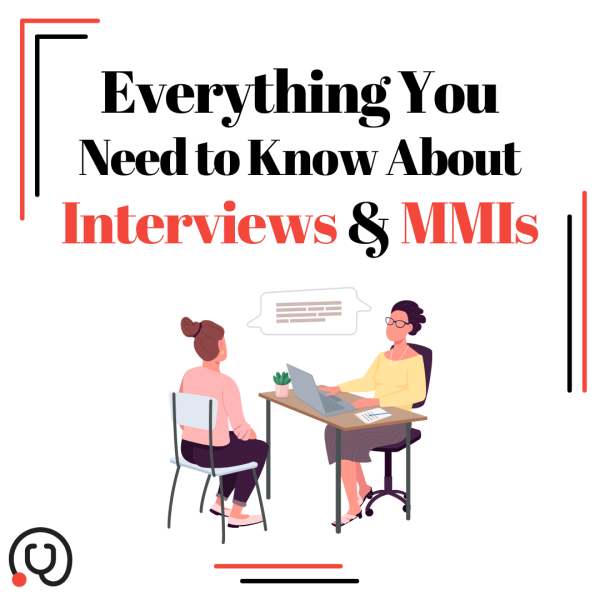Everything You Need to Know About Interviews and MMIs

5 months ago by Chris
Congratulations on having made it through the UCAT! Having taken the UCAT, the first step of your medical application process is now over and you are heading towards interviews where your comprehension, problem-solving and situational judgement skills will also be assessed just like the UCAT, but in a more up-close and personal manner.
Interviews are an opportunity to see a part of you that your UCAT score does not demonstrate - your interpersonal skills, communication, empathy and past experiences. Whether you did better or worse than you expected on UCAT test day, it is important to prepare for medical interviews early to help secure your spot at medical school next year.
In this blog, we will be discussing everything you need to know about interviews, answering general questions you may have. This includes a brief overview of the types of interviews, what to expect for each type of interview and some common medical interview questions you may be asked.
Why are interviews used?
Interviews are used to allow medical schools to get a better grasp of you as a person. Medicine is a highly demanding profession which involves working with vulnerable populations, and requires doctors who are competent, empathetic and can work well within multidisciplinary teams.
Interviews are also used to identify applicants that exhibit major red flags - for example, applicants who are interested in medicine for the 'prestige' or the 'high salary'. Oftentimes, these types of applicants have little to say when asked about empathy, communication or other attributes of a doctor.
Finally, interviews are used to assess applicants' ability to problem-solve under pressured conditions. Medical interview assessments place you under pressure, and therefore assess your ability to think quickly on the spot. As a doctor, being able to perform well under pressure can mean life or death for patients.
When do interviews take place?
First and second round interviews typically take place from November to February.
When should I start expecting offers?
Offers are sent according to the round in which candidates are interviewed and the date that each state's Tertiary Admissions Centre designates (hence offers can come out at various times).
Why do I need to prepare?
Many applicants say, “I don’t need to prepare for interviews because they assess me on my true and genuine personality.” While this is most definitely true (interviewers want to see you in an authentic manner), you want to present your “best self” in an interview situation.
Furthermore, there is more that interviewers look for that is not achievable without preparation - for example, having a solid understanding of the qualities required to be a doctor, an understanding of the profession, and knowledge about the health system and ethical issues. Having this knowledge shows your genuine motivation for the profession, as well as your interest and initiative.
Medical interviews are high-pressured, challenging and stressful environments, even for the most prepared and competent candidate. They are also a very important criterion for entry into medicine or dentistry. However, by preparing and understanding potential medical interview questions that may arise, you will be in a much better position to succeed.
How should I prepare?
Successful interview preparation involves understanding the strategies required to succeed in interviews, the types of questions that will be asked, how to approach each type of question, what interviewers are looking for in candidates and how to show your "best self" in the interview situation. This is all covered in MedEntry’s Medical Interview Training.
What are the types of medical interview?
There are two major types of medical interview: the Multiple Mini Interview (or MMI) and panel interviews.
Multiple Mini Interviews
This is currently the most common interview type, because it minimises interviewer bias and can test applicants holistically across different scenarios. It also allows applicants to demonstrate their skills rather than simply conveying their past experiences.
It consists of short stations which involve scenarios assessing a wide variety of skills, including your thought processes, empathy and problem-solving skills. In each MMI station, you will be given some time to read a prompt and to strategise your answer.
Here are some example MMI prompts:
- Example 1: You are a doctor, and a 14-year-old female patient comes to you asking for an abortion of her 5-week pregnancy. She asks you not to alert her parents. What ethical issues are present in this scenario?
- Example 2: You are a medical student preparing for your final year exams which determine your hospital placements for the following year. Your friend sends you an email with exam questions from previous years. You feel that this is wrong, but your friend reassures you that everyone else has seen these questions too and you would be at a disadvantage if you don't look at them. What would you do?
Traditional Panel Interviews
This will most likely be the type of interview you think of when you hear the words 'medical interview'. Panel interviews involve one or two (or sometimes more) interviewers asking you questions. It can be particularly challenging as one poor answer could give a bad impression for the rest of your interview. However, this interview style also allows you to build rapport and connect more deeply with your interviewers.
The universities that usually use traditional panel/semi-structured panel interviews are James Cook University, UNSW, Sydney University and Charles Sturt University (dentistry).
Traditional panel interviews usually consist of more straightforward questions, as well as occasional scenario questions.
Some examples of questions include:
- Why did you choose this university?
- What made you want to study medicine/dentistry?
- Describe a situation where you displayed empathy/compassion.
- What is your biggest weakness?
As you can see, medical interviews can be difficult, stressful and challenging, but with the right preparation, you can succeed!


